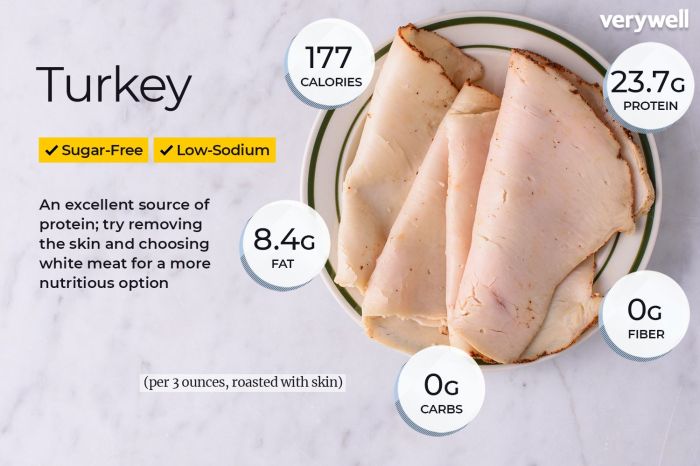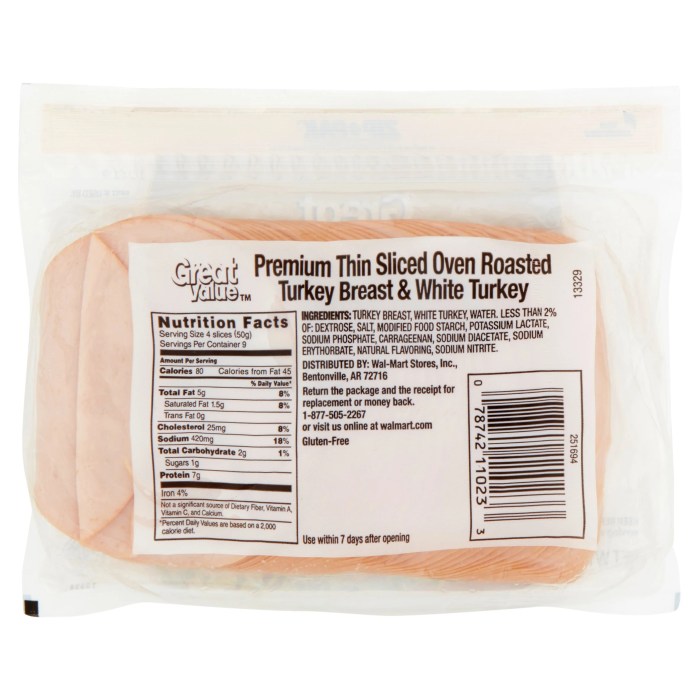Health Implications of Consuming Turkey Lunch Meat: Nutrition Facts For Turkey Lunch Meat

Nutrition facts for turkey lunch meat – Turkey lunch meat offers a convenient and readily available source of protein, a crucial macronutrient for building and repairing tissues, supporting immune function, and maintaining overall health. Its incorporation into a balanced diet can contribute positively to daily protein intake, particularly for individuals seeking a quick and easy protein source. However, it’s crucial to understand both the potential benefits and drawbacks associated with its regular consumption.Turkey lunch meat’s protein content is a significant advantage.
A serving provides a substantial amount of this essential nutrient, contributing to satiety and aiding in muscle maintenance. This is particularly beneficial for individuals with active lifestyles or those aiming to manage their weight. However, the nutritional profile extends beyond just protein, and careful consideration of other components is vital.
Protein Content and Benefits
Turkey lunch meat is a good source of lean protein, contributing to muscle growth and repair. The protein in turkey helps build and maintain muscle mass, which is important for strength, mobility, and overall metabolic health. For example, a single serving can provide a significant portion of the daily recommended protein intake, particularly beneficial for athletes or individuals engaged in strenuous physical activity.
So, you’re checking the nutrition facts for turkey lunch meat, huh? Trying to be healthy, aye? Well, before you go all “diet mode,” remember that even healthy choices can pack a punch. Think about it – you might want to compare that to the calorie count of other drinks, like, check out the nutrition facts chai latte starbucks if you’re a fan.
Then, you can make a proper comparison and go back to figuring out your turkey lunch meat game plan, you know, balance is key, man!
The high protein content also contributes to feelings of fullness, which can aid in weight management by reducing overall caloric intake. Lean protein sources like turkey breast are preferable to fattier meats for heart health and weight control.
Potential Risks Associated with Regular Consumption
While offering protein benefits, regular consumption of turkey lunch meat presents potential health risks. The sodium content is often high in processed meats like turkey lunch meat, exceeding the recommended daily intake for many individuals. High sodium intake is linked to hypertension and increased risk of cardiovascular diseases. Furthermore, many processed meats contain preservatives, such as nitrites and nitrates, which have been linked to increased cancer risk in some studies.
The processing methods employed can also reduce the overall nutritional value compared to fresh turkey breast. For instance, some brands may contain added sugars or unhealthy fats, further impacting the overall health profile. A reliance on processed meats like turkey lunch meat should be balanced with a variety of whole, unprocessed foods.
Infographic: Turkey Lunch Meat – Benefits and Drawbacks
Illustrative Section (Text-Based Infographic):Top Half (Benefits):* Large, bold text: Protein Powerhouse!
Descriptive text
Provides a significant amount of lean protein, crucial for muscle building and repair. Supports satiety and aids in weight management. Contributes to overall health and well-being. Imagine a strong, toned body benefiting from the protein boost. Bottom Half (Drawbacks):* Large, bold text: Sodium and Preservatives: Proceed with Caution!
Descriptive text
High sodium content may contribute to hypertension and cardiovascular issues. Preservatives, such as nitrites and nitrates, are linked to potential health risks. Visualize a salt shaker overflowing, symbolizing excessive sodium. Imagine a warning label on a package, highlighting potential preservatives.
Turkey Lunch Meat in a Balanced Diet

Turkey lunch meat, when consumed mindfully, can be a part of a healthy and balanced diet. Its lean protein content makes it a valuable addition to various meals, contributing to satiety and muscle maintenance. However, mindful portion control and careful consideration of accompanying foods are crucial to prevent an imbalance in overall nutrient intake. Remember that relying solely on processed meats, including turkey lunch meat, is not advisable for optimal health.
Incorporating turkey lunch meat into a balanced diet requires strategic planning and mindful food choices. It’s essential to balance the protein from the lunch meat with ample servings of fruits, vegetables, and whole grains. This approach ensures a well-rounded nutritional profile, preventing nutrient deficiencies and promoting overall well-being.
Healthy Meal Examples with Turkey Lunch Meat, Nutrition facts for turkey lunch meat
The following examples demonstrate how turkey lunch meat can be incorporated into healthy and balanced meals, highlighting the importance of combining it with nutrient-rich components to create a complete and satisfying meal.
- Turkey and avocado sandwich on whole-wheat bread: This combines lean protein from turkey with healthy fats from avocado and fiber from whole-wheat bread. A side salad with mixed greens and a light vinaigrette further enhances the nutritional value.
- Turkey lettuce wraps with bell peppers and hummus: This low-carb option uses crisp lettuce leaves as wraps, filled with sliced turkey, colorful bell peppers, and a serving of hummus for added protein and healthy fats.
- Turkey and quinoa salad with roasted vegetables: This provides a balanced mix of protein (turkey), complex carbohydrates (quinoa), and vitamins and minerals from roasted vegetables like broccoli, carrots, and sweet potatoes.
Sample Weekly Meal Plan with Turkey Lunch Meat
This sample meal plan illustrates how to integrate turkey lunch meat into a diverse and balanced weekly diet, emphasizing portion control and nutritional variety. Remember to adjust portion sizes based on individual caloric needs and activity levels.
- Monday: Turkey lettuce wraps with bell peppers and hummus; side of mixed greens.
- Tuesday: Turkey and avocado sandwich on whole-wheat bread; small apple.
- Wednesday: Turkey and quinoa salad with roasted vegetables.
- Thursday: Turkey breast slices with a large mixed green salad and a small serving of whole-grain crackers.
- Friday: Turkey chili with kidney beans, corn, and brown rice.
- Saturday: Leftovers or a similar healthy meal.
- Sunday: Turkey meatballs with zucchini noodles and marinara sauce.
Turkey Lunch Meat vs. Alternative Lunch Options
Comparing turkey lunch meat to other lunch options reveals its strengths and weaknesses in terms of nutritional profile. This comparison considers factors like protein content, fat content, sodium content, and overall nutritional value.
| Lunch Option | Protein (g per serving) | Fat (g per serving) | Sodium (mg per serving) | Other Nutritional Considerations |
|---|---|---|---|---|
| Turkey Lunch Meat (3 oz) | 25-30 | 5-10 | 400-600 | Good source of lean protein; can be high in sodium depending on brand. |
| Chicken Breast (3 oz) | 25-30 | 2-5 | 50-100 | Excellent source of lean protein; lower in fat and sodium than turkey lunch meat. |
| Tuna Salad (3 oz) | 20-25 | 10-15 | 300-500 | Good source of protein and omega-3 fatty acids; can be high in sodium and fat depending on preparation. |
| Hard-boiled Eggs (2 large) | 12-15 | 10-12 | 100-150 | Excellent source of protein and essential nutrients; naturally lower in sodium and fat. |
Question & Answer Hub
Is turkey lunch meat a good source of protein?
Yes, turkey lunch meat is a relatively good source of protein, though the exact amount varies depending on the brand and type. However, it’s crucial to consider the sodium and fat content in relation to overall protein intake.
How much sodium is typically in turkey lunch meat?
Sodium content varies significantly depending on the brand and processing method. Low-sodium options exist, but it’s crucial to check nutrition labels carefully as many brands are relatively high in sodium.
Are there any preservatives in turkey lunch meat?
Yes, many commercially produced turkey lunch meats contain preservatives to extend shelf life. Checking the ingredient list will reveal specific additives used.
Can I eat turkey lunch meat every day?
While it’s a convenient protein source, daily consumption of turkey lunch meat isn’t recommended due to potential high sodium and processed fat content. Moderation and variety are key.



